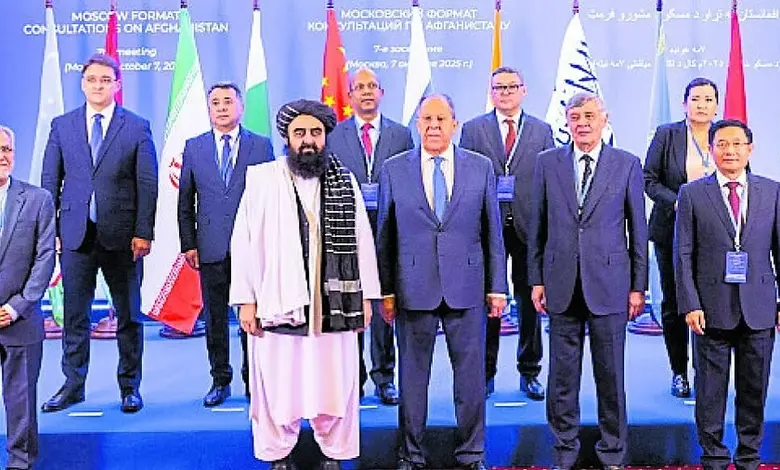New Delhi: In a show of regional solidarity, India aligned with Russia, China, Pakistan, Iran, and key Central Asian countries on Tuesday to reject U.S. President Donald Trump’s proposal to reclaim the Bagram Air Base from Taliban control in Afghanistan.
The stance comes amid strained ties between New Delhi and Washington, yet India firmly opposed the American effort to reestablish a military foothold at the strategic site near Kabul. Representatives from India, Iran, Kazakhstan, China, Kyrgyzstan, Pakistan, Russia, Tajikistan, and Uzbekistan, alongside the Taliban administration, issued a unified declaration labeling such foreign military deployments in Afghanistan or adjacent territories as “unacceptable.” They argued that these actions would undermine broader peace and stability in the region.
This collective rebuke emerged from the seventh round of “Moscow Format Consultations” on Afghanistan, convened in the Russian capital with special envoys and high-level officials. The communiqué, released post-meeting, underscored a shared commitment to preventing external interference that could destabilize the area.
India’s ambassador to Moscow, Vinay Kumar, represented New Delhi at the discussions. Also in attendance was Amir Khan Muttaqi, the Taliban’s acting foreign minister, who is slated for an upcoming trip to the Indian capital.
The Bagram facility holds pivotal historical weight. The U.S. vacated it during its troop pullout in August 2021, paving the way for the Taliban’s resurgence after 20 years of Western-backed governance. Although Trump’s initial presidency saw the signing of a February 2020 accord with the Taliban in Doha laying groundwork for their eventual takeover he has since pinned the ensuing disorder on his successor, President Joe Biden, particularly the hasty abandonment of Bagram.
In recent remarks, Trump asserted that a future administration under his leadership would seize back the base, emphasizing the Taliban’s dependence on American backing. He highlighted its proximity to a Chinese nuclear development site and issued stark warnings to the Taliban, threatening “bad things” should they refuse to relinquish the outpost.
Kabul’s rulers swiftly dismissed the overture, signaling no intent to yield.
The Moscow talks, featuring Russia’s Foreign Minister Sergei Lavrov and Muttaqi, highlighted ongoing diplomatic maneuvers to address Afghanistan’s volatile landscape. As global players navigate post-withdrawal dynamics, this opposition reflects deepening concerns over renewed superpower rivalries in South Asia.
